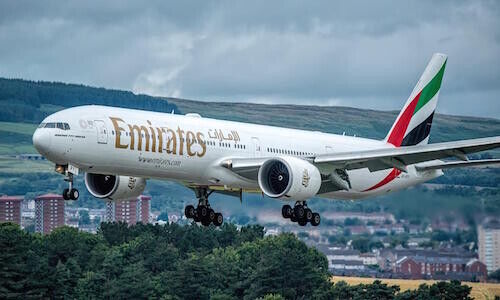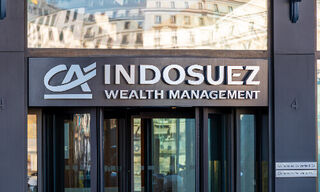Josef Schuster: «Emirates IPO Would Be a Landmark Event»
Josef Schuster of financial index provider Ipox examines the latest IPOs in the Middle East. «Very few companies carry the same level of strategic significance and brand strength as Emirates,» he said in reference to the Arab airline’s plans.
Written by Gérard Al-Fil, Dubai.
Mr. Schuster, President Trump paid a multi-day visit to the Gulf region in May. How closely was this followed back in the US?
The event was followed closely here in the US and President Trump’s trip was widely viewed as a diplomatic and deal-making success, and while high-level state visits often attract strong media attention, the more important story for long-term investors lies elsewhere. From an investment perspective, what truly matters is the region’s structural economic transformation: ongoing diversification, privatization, and the deepening of capital markets. These trends are what drive durable opportunity and will continue well beyond the headlines of any single visit.
You have been developing indexes for IPOs for 20-plus years. What role do the GCC financial markets play in your product portfolio?
At Ipox, we have pioneered dedicated IPO-focused investment strategies via mutual funds and ETFs. In that context, GCC exposure in our global portfolios has transformed from a niche exposure to a core strategic component. As the region has undergone a significant economic transformation, shifting away from its historically government-centric and oil-dependent model toward broader sector diversification, the IPO landscape has become incredibly dynamic and reflects this change.
Initially, our exposure was in traditional sectors like infrastructure and energy, including the landmark Aramco listing. Today, we are seeing a new wave of dynamic, high-growth companies come to market across technology, healthcare, fintech, consumer goods, and logistics.
«Emirates is a 'trophy asset', a mature, premium global brand with a powerful operating franchise»
For example, alongside our early investments into hospital network Sulaiman Al Habib and IT services provider Elm, we have also seen standout IPOs from companies like Nadi Medical (retail pharmaceutical), ADNOC Gas (a regional gas distribution giant), and Alamar Foods (operator of Domino's in MENA).
Hence, yes, the GCC has become increasingly present in our strategies – both in terms of opportunity and performance contribution – as the region is no longer just an oil story but a diversified growth story, embracing debt and equity capital markets as part of its broader economic vision.
Emirates is generally ready for an IPO, according to executive chairman Sheikh Ahmed Bin Saeed Al-Maktoum, though no concrete dates are on the table. How would you judge an IPO?
We have seen several successful airline IPOs from emerging markets in recent years, including Tigerair Taiwan and Latam Airlines Group, both of which delivered strong post-listing performance. This reflects investor appetite for regionally dominant carriers with growth potential.
An IPO of Emirates would be a landmark event for global aviation and GCC capital markets. It is a 'trophy asset', a mature, premium global brand with a powerful operating franchise. Depending on valuation and structure, it would likely be a highly attractive opportunity and would likely attract significant institutional and retail interest, particularly from investors seeking exposure to emerging markets growth.
Civil aviation IPOs have gained traction globally, but few companies bring the same strategic importance and brand equity to market as Emirates.
Abu Dhabi’s Etihad Airways also announced an IPO recently. Now the CEO said they would go ahead even though the carrier does not need the cash. Then why would it go public?
A successful listing can deliver significant marketing and reputational benefits, especially for a global carrier like Etihad. Going public also enhances financial flexibility, as listed equity can be used as a strategic currency for future partnerships, acquisitions, or expansion initiatives.
Even if an airline doesn’t need immediate capital, a public listing can position the company more competitively for long-term growth. Given the strong economic momentum across the Gulf region and the broader push to deepen capital markets, Etihad’s decision to move forward with an IPO makes strategic sense.
What could both carriers learn from the privatization of Germany’s Lufthansa and its listing back in 1997?
First, it shows that the successful transition from state to private ownership is complex and involves careful sequencing in terms of corporate governance, dealing with important stakeholders (such as unions), and full financial transparency, while communicating a clear path for growth. What Lufthansa did well, I believe, was to structure and position itself as both the leading national and a globally competitive airline – a balance which both Gulf carriers will also need to strike.
«The 2025 GCC IPO market has seen stronger activity, with nearly double the number of listings»
Second, Lufthansa entered the market with a compelling narrative to structure the firm to be as close to its customers as possible, with less red tape and greater team spirit in order to react more quickly and efficiently to ever-changing customer needs – themes that also should resonate with the Gulf carriers.
Lastly, with all these operational aspects in mind, the benefits of a fully public listing increased Lufthansa's access to capital markets and enabled M&A potential while incentivizing its employees and stakeholders. For Emirates and Etihad, a listing is primarily about global positioning and aligning with the broader transformation underway in the GCC.
How do you judge the IPO climate in 2024, in the GCC and the current IPO pipeline in 2025 in the region?
Looking strictly at the first five months, the 2025 GCC IPO market has seen stronger activity, with nearly double the number of listings and roughly double the proceeds raised across the region, including listings in Bahrain, Kuwait, Oman, Qatar, Saudi Arabia, and the UAE.
On the other hand, the aftermarket has been soft. Our Ipox MENA Strategy, which invests in 30 of the most promising MENA-domiciled IPOs sourced by our team, is down approximately 8 percent year-to-date, as many listings have struggled to maintain their offer prices due to high initial valuations and investor caution around potential secondary offerings.
Still, the IPO pipeline remains active, and we are optimistic that a second-half rebound in secondary market performance is possible, mirroring 2024. A rebound in some of our key positions in the region, including fibre optic cable manufacturer Riyadh Cables and parking operator Parkin in Dubai, will help other IPOs to recover as well.
A number of companies were privatized by the state authorities, such as several insurance firms listed at the Tadawul market in Saudi Arabia. How do firms that were made listed firms by state authorities in the GCC perform, in comparison to pure private companies?
State-led privatizations can offer incredible scale, market dominance, and an implicit level of government support, which provides stability. The primary risk investors weigh is whether decisions will be driven by commercial logic or state policy. In contrast, purely private companies that go public are often seen as more agile and offering pure-play growth, with governance structures designed to align with shareholder interests.
At Ipox, we look at the performance and growth prospects on a case-by-case basis, rather than whether it originates as a state-owned entity or a private firm. There is merit in investing in both for a well-diversified portfolio.
You travel to the GCC regularly for business. How do you judge the readiness among wealthy and retail investors to invest in their own firms?
The GCC countries and their respective investors are highly enthusiastic and very entrepreneurial, very comparable to many Asian countries and the United States. We see a powerful sentiment for domestic firms evidenced by the significant oversubscription rates for nearly every major IPO.
«Companies like Aramco and Qatar National Bank are pillars of the GCC economy»
This enthusiasm among both wealthy and retail investors will provide stable liquidity for new listings and is a key factor in the successful development of the region's equity culture, helping the successful transition from an oil- and materials-dependent economy to a service-based society.
Most GCC currencies are pegged to the greenback, with the exception of the Kuwaiti Dinar, which floats against a basket of currencies. Does the dollar peg have any influence on IPOs in the region?
Having a stable currency greatly helps to increase the confidence of international capital to invest in the region. It effectively removes currency risk, which is one of the biggest hurdles for foreign investment in emerging markets. This has already manifested in the surging presence of financial services firms across the region, including private banks, hedge funds, and their respective service providers.
What role do GCC heavyweights like Aramco or Qatar National Bank play in your index family?
Companies like Aramco and Qatar National Bank are pillars of the GCC economy and its benchmarks. However, in our specific Ipox strategies, they are no longer featured and considered «seasoned» companies. Our unique methodology is to focus on global IPOs, spin-offs, and similar companies for the first few years after they list, capturing the most dynamic phase of their life as a public company. Once a company graduates beyond that Ipox inclusion period, it is no longer held in our portfolios. So, while we recognize their importance, our role is to capture the performance of the next generation of stocks.
Josef Schuster is the founder and CEO of Ipox Schuster LLC, an index developer, which he founded in 2003 in Chicago, Illinois. The firm specializes in financial products related to global IPOs and spin-offs.



























